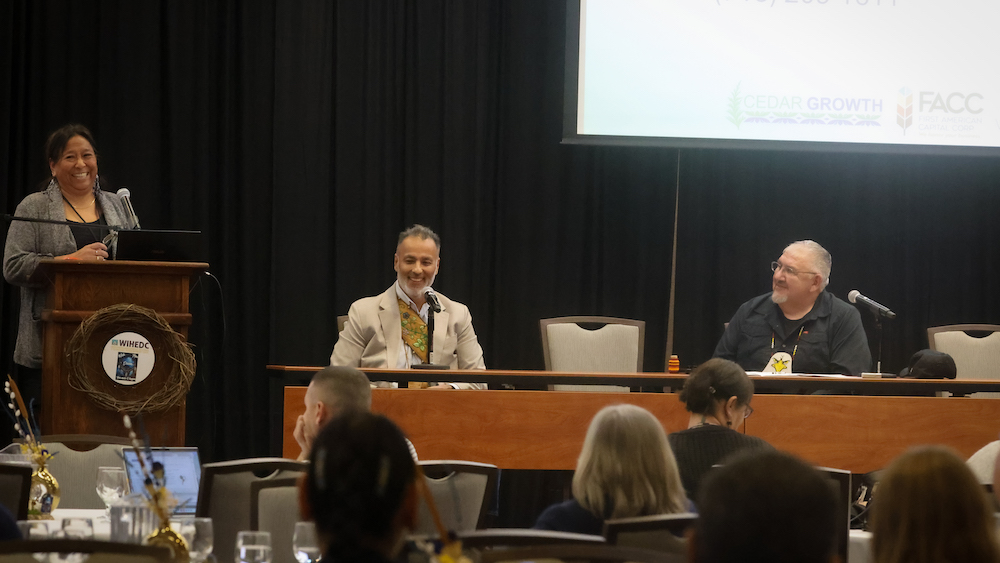
- Details
- By Brian Edwards
- Economic Development
LAC DU FLAMBEAU, Wisc. — Wisconsin tribal leaders said affordable housing capacity on tribal land is becoming structurally unmanageable under current models — and tribes may need to shift away from being the primary landlord in the future.
Leaders from four Wisconsin nations gathered Wednesday at the Wisconsin Indigenous Housing & Economic Development Corp. conference to discuss economic development priorities, with housing challenges dominating much of the conversation. For years, tribes have stretched federal housing dollars across large waitlists, but decades of flat funding levels and construction inflation have now pushed the current system to a breaking point.
Ho-Chunk Nation President Jon Greendeer warned that traditional tribal housing development models have become financially unsustainable. He said construction costs now outpace household income growth, and tribes that continue building homes through government programs alone “are not going to be able to meet the need by any means at all.”
With federal programs unlikely to scale at the pace demand requires, Greendeer said tribes need to start thinking about models that leverage private capital without sacrificing tribal sovereignty.
Greendeer detailed the financial pressures facing tribal housing authorities when they subsidize rents below fair market value. A unit with a fair market value of $1,500 monthly often rents for $900 in tribal communities, leaving housing entities unable to cover maintenance, capital improvements and depreciation costs.
“While it sounds great to be paying $900 a month in a $1,500 unit, that reduction also means that the landlord, aka the nation proprietor housing development or the agency, is unable to not only recoup any type of revenue into the black, but also not have the resources to fix the furnace when it crashes,” Greendeer said.
He advocated shifting toward down payment assistance, rental assistance and mortgage subsidies rather than direct construction and property ownership.
Nicole Boyd, chairwoman of the Red Cliff Band of Lake Superior Chippewa, said her nation faces a critical gap in property management capacity as it rapidly expands its housing inventory. The Red Cliff Band’s tribally designated housing entity manages roughly half of the reservation’s housing units, making it the largest landlord on Red Cliff land.
“We've been fortunate to secure a large amount of competitive funds or other tribal investments in the last few years, and are adding a large quantity and a huge influx of housing units to the inventory to be managed,” Boyd said. “We need to build a partnership, because we have to bridge a new model.”
Boyd called on housing partners to provide technical assistance specifically for property management, noting that lending expertise is already well-established but operational support lags behind.
Lac du Flambeau President John Johnson said his nation estimates it will need 1,200 additional homes over the next decade. The housing waitlist affects families across income levels, including dual-income households who qualify for low-income housing but face indefinite waits.
“We have families here with dual incomes that are going to be on this housing list, but for low income that can never, you know, get one of these homes in the future,” Johnson said.
Forest County Potawatomi Secretary Alexandria McCorkle said her nation's housing waitlist has more than 300 tribal members, with staff recently processing applicant number 150 — meaning more than half the list remains. The tribe has begun exploring partnerships with the Wisconsin Native Loan Fund and Bay Bank to provide financing options that allow members to purchase homes without waiting years for tribal housing.
“Homes don't just sit there and wait for you,” McCorkle said. “So they're going to need the options, the opportunities, to be able to afford a home and be proud of it.”
Food security emerged as another priority, with leaders citing recent federal policy discussions as a catalyst for renewed focus on food sovereignty initiatives. Boyd said tribal nations should pursue collective food production efforts, noting that communities already demonstrated capacity during the pandemic. Leaders also noted that post-election policy volatility could affect future funding streams, making self-sustaining food systems and capital models more urgent.
“Food is a big one, and I think it's a kind of a next step for us, and in terms of whatever the forecast is, whatever the political weather blows our way, we're always going to need food,” Boyd said.
Johnson presented data from Lac du Flambeau community input sessions showing demands for language preservation, cultural education, natural resources training, wellness facility expansion and infrastructure development. He emphasized that tribes serve as major regional employers whose economic health affects entire communities.
The panel — moderated by Becky Albert-Breed, a member of Ho-Chunk Nation and executive director of Cedar Growth, a Native CDFI — was held at Lake of the Torches Resort Casino in Lac du Flambeau.
